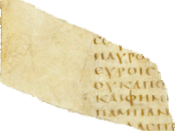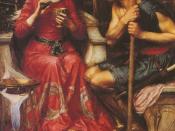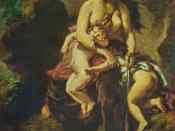In 430 BC, Euripides wrote of the stereotypes women faced in Greek culture and of one woman who transgressed the set roles females were expected to play. "Medea" is a complex and controversial myth that can be read either as a story of a crazy woman who heartlessly kills her children, or as a feminist tale of a woman driven to forsake her femininity to strike back at the society that tried to mold her. In "A Counter Epic," Rena Traden writes of a group of women in prison, led by Rhodessa Jones, who modernized and preformed the tale of "Medea" with a vastly changed ending. It can be helpful to remake and rewrite myths in order to make them appeal to an audience that, under usual circumstances, would not be able to appreciate them because of lingual or cultural barriers. Still, changing the moral or main point of a myth to fit in with modern standards of human conduct can often defeat the purpose and hinder cultural broadening.
The classic tale of "Medea" ends with Medea escaping after killing Jason's new wife, the king Creon, and her two sons. The sun god comes to her rescue and she exits with her dead sons on a chariot. In the remade Rhodessa Jones version, Medea is arrested for her crimes and presumably dies. The other changes that were made by Jones were mostly aimed at vernacular and general modernization of the piece. The new version was set in a nineteen nineties lower class intercity. All of the language was translated into current slang and references to contemporary social structures were made.
The alterations made to the original play are, for the most part, beneficial. It is important to expose the ideas presented in classical literature to people living in modern...


